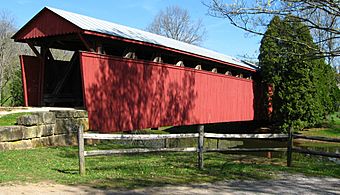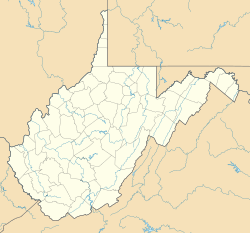Staats Mill Covered Bridge facts for kids
Quick facts for kids |
|
|
Staats Mill Covered Bridge
|
|

Staats Mill Covered Bridge
|
|
| Location | Cedar Lakes, Jackson County, West Virginia |
|---|---|
| Area | 0.3 acres (0.12 ha) |
| Built | 1887 |
| Architect | Hartley, H. T. |
| Architectural style | Long truss |
| MPS | West Virginia Covered Bridges TR |
| NRHP reference No. | 79002582 |
| Added to NRHP | 29 May 1979 |
The Staats Mill Covered Bridge, also called the Tug Fork Covered Bridge, is a historic wooden covered bridge in Jackson County, West Virginia, United States. It was built way back in 1887. This bridge first crossed the Tug Fork of Big Mill Creek. It was named after Enoch Staats, who had a water-powered mill nearby.
Contents
Discovering the Staats Mill Bridge
The Staats family were some of the first people to settle in this area around 1780. The bridge was built right next to Enoch Staats' mill and store. This made it a very important part of life and growth in Jackson County. The local government, called the Jackson County Court, paid for the bridge to be built. Local builders and craftspeople worked together to create this amazing structure.
How the Bridge Was Built
The Staats Mill Covered Bridge is nearly 100 feet (30 m) long. It was built using a special design called the Long truss system. Stephen Long invented this system in 1830. A cool thing about Long trusses is the "X"-shaped braces you can see in each section. This bridge has 11 of these sections, each about 8 feet 7 inches (2.62 m) long and 14 feet 3 inches (4.34 m) deep. The bridge is a great example of how timber bridges were built in the late 1800s.
A Historic Landmark
Because of its importance and unique design, the Staats Mill Covered Bridge was added to the National Register of Historic Places in 1979. This list includes buildings, sites, and objects that are important in American history.
Moving the Bridge
In 1983, the old bridge was moved to a new home! It traveled about 3 miles (5 km) from its original spot to the FFA-FHA State Camp at Cedar Lakes. There, it was carefully put back together across a pond. Moving and rebuilding the bridge cost a lot of money, but it was worth it to save this piece of history. Today, the bridge is in excellent shape and people can walk across it. Dr. Emory Kemp from West Virginia University was a big help with his knowledge and skills during the moving project.
 | Dorothy Vaughan |
 | Charles Henry Turner |
 | Hildrus Poindexter |
 | Henry Cecil McBay |



